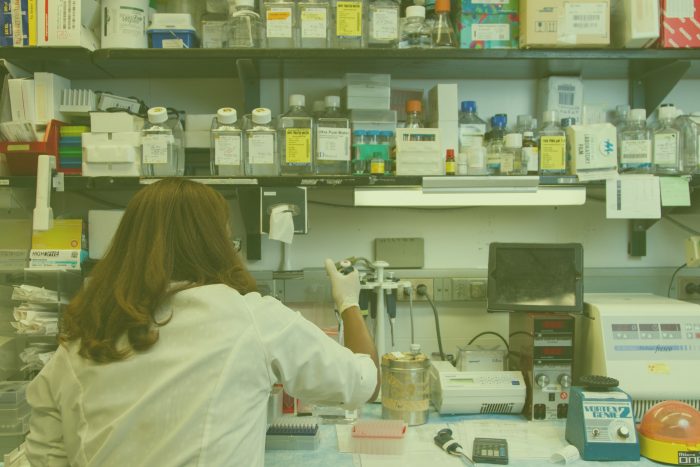The healthcare industry is incredibly competitive—especially in the field of oncology. Breakthroughs and advancements in cancer treatments and therapies are hitting the market rapidly, parallel to technology.
As technology continues to transform methods for treating or managing cancer, as well as recruiting cancer patients for clinical trials and educating HCPs (healthcare professionals) on up-and-coming treatments, pharma companies and oncology practices require strategic, expert marketing strategies to reach their goals.
Effective oncology marketing is focused on creating awareness of emerging therapies, increasing awareness of disease states and treatment options that are currently available, reaching HCPs, patients and caregivers to provide them with the information they need where they’re receptive, and acquiring more cancer patients for cancer care centers. To reach these goals, pharma companies require a marketing methodology that communicates with their target audience through an empathetic, humane, personable lens.
Establishing a pharma brand that resonates well with HCPs, caregivers and patients means placing heavy emphasis on ethical marketing. Marketing messages and the methods used to disseminate these messages require tact and thoughtfulness.
The oncology market is expanding exponentially, yet less than 5% of adult cancer patients are enrolling in cancer clinical trials. On a general scale, an estimated 70% of Americans are willing to participate in clinical trials. So, where is the disconnect? Why is it challenging to recruit patients for clinical trials? The answer is in the approach.
Oncology marketing presents significant challenges, as pharma companies often struggle to present information in a way that’s not only informative, but digestible, relatable, and ethical.
Pharma companies must take a patient-centric approach in their marketing strategies, keeping in mind the impact these treatments and services have on people’s lives. Patients and caregivers are people, not just numbers, leads or conversions.
As the oncology field is constantly changing, pharma companies and oncology practices need to persistently transform their approach to meet new demands and integrate new treatments. During the course of a single patient’s treatment, new developments are likely to arise, requiring providers to be agile and pivot their strategy as necessary.
To position themselves competitively in the oncology field, companies need to be progressive, maintaining a cohesive brand identity while remaining flexible and adaptable. Pharma companies that fail to adapt will be outperformed by companies that demonstrate a genuine understanding of the evolutionary oncology field.
At the forefront of a successful oncology marketing strategy is relatable language that remains consistent across-the-board, throughout all marketing messaging. Quality content is king, as pharma marketing channels are inundated with countless advertisements for cancer care services and treatments. That means your brand’s messaging needs to stand out from the rest.
Oncology practices and pharma companies that understand the value in marketing strategies that capitalize on multiple channels, including traditional marketing and digital marketing, have the upper hand. Print advertising, social media advertising, search engine optimized (SEO) website content, TV advertising, Point of Care, Out of Home, Google Adwords and PPC advertising—they each hold a valuable place in oncology marketing.

Recent trends in digital marketing and DTC (direct-to-consumer) marketing have changed the game. DTC advertising in the oncology field has seen a dramatic jump from 1997 to 2016. In 1997, about $2.1 billion was spent on consumer advertising in medical marketing. By 2016, a whopping $9.6 billion was allocated to consumer marketing.
With this drastic increase in DTC advertising came the rise of social media advertising, online and in-person patient support groups, paid search advertising, and advertising through modern applications.
Elements of an Effective Oncology Marketing Strategy

An effective oncology marketing strategy requires careful consideration when developing each marketing segment. From branding to paid advertising, to oncology drug launches and the content that comprises each vertical, oncology practices and oncology marketers must be strategic and intentional, by way of a comprehensive marketing plan.
Oncology Branding
No matter the industry, a successful brand positions itself as a trusted entity in the market. Especially in the oncology field, where patient and caregivers’ lives are directly and significantly impacted, oncology brands need to provide value to their audience and position themselves as an informative leader in the field.
Oncology brands serve as the supporting connection between HCPs, their patients and their caregivers. This is done by developing a meaningful brand that engages providers and patients before the launch of new oncology drugs, post-launch, and when spreading information about disease states or available treatments.
Your brand needs to stay relevant in the ongoing conversation of cancer care, encouraging your audience to seek out your brand as a reliable source of information. Developing a trusted brand means establishing a cohesive presence, both in-person and online. Stay up-to-date on the latest information, in terms of research and new developments. Associate your company’s presence with transparency, integrity and honesty, by sharing helpful information on what patients and HCPs can expect from hospital stays, clinical trials, new treatments or procedures.
Sharing limited or dishonest information with the hopes of appealing to the target audience will only damage your brand’s reputation and discredit your company or practice. Oncology is a sensitive field; patients, caregivers and providers will always choose honest, up-front brands over seemingly reticent brands.
Digital Advertising
Reach your audience (whether it be healthcare providers, oncologists, payers or patients) where they’re already present. Today, people want ease and convenience when seeking information—and that usually means taking to the internet.
Your audience is searching for you online, so you need to ensure that your online presence is valuable and that you’re using the right data tools to gain insights from media consumption habits. These insights are fundamental for improving future media decisions to increase your marketing ROI.
Google Adwords marketing campaigns are incredibly cost-effective, as oncology marketers can perform market research to identify the individual search terms their audience is using to find the practice or pharmaceutical company’s treatment options or services.

To perform effective market research, companies require the necessary tools, programs and platforms that enable a highly-targeted approach. Digital advertising campaigns that narrow down the target audience by demographic, interest, location, or provider specialty can effectively increase the chances of leads converting into new patients or prescribers.
Digital marketing presents the opportunity to perform ad retargeting, ensuring that your pharmaceutical or oncology brand appears in front of users who are already interested in and seeking out your services or treatments. Displaying a consistent message in front of prospects numerous times can help to establish a trusted online reputation that encourages your leads to take action.
Like the general oncology arena, digital marketing is flexible. Marketing campaigns can be adjusted consistently and refined based on data, results and insights.
Oncology Drug Launch Strategy
During oncology drug launches, strategic marketing is critical for maximizing results from the launch. Marketing campaigns should speak to the HCP journey or patient journey, depending on the intended audience. Personalization of content in ad campaigns is fundamental, from the beginning market research performed to recruit patients, to the post-launch data gathered and later used to improve future marketing campaigns.
Once the market audience is identified for an oncology drug launch, marketers need to develop messaging that resonates with the HCP or patient at the exact point they’re located in their journey. Is the audience currently using another drug or treatment? Have they recently been diagnosed with their condition, or are they far along in their journey and now in need of comfort care?
It’s a good idea to include past patient experiences and success stories to relate to the audience and provide a sense of hope when launching an oncology drug. Patients and providers want effective treatments. Your oncology brand is responsible for presenting your audience with the results and information they want to see, when they want to see it.
Quality Content
Across all marketing channels, medical practices and companies must develop engaging, personalized content that compels prospective patients or healthcare providers to take action. Whether your company’s marketing efforts aim to convert users to new patients for a cancer center or a new therapy, recruit patients for upcoming clinical trials, or convert health care providers into prescribers for your treatment, the content created for your marketing campaigns must be high-quality to outperform competing companies.
On digital marketing channels, content should include relevant keywords, formatting and funnels that maximize the user experience. Content should be audience-centric and consider the needs of the providers or patients by presenting information in a way that’s convenient, easily-digestible, easily-accessible and engaging enough to encourage users to convert.
Content that’s interactive and informative will resonate well with the audience, as it grabs their attention and provides a unique, memorable experience for users. Ensure brand recognition and awareness by constructing content that remains consistent across all media channels.
How Good Apple Can Help
Your brand needs a marketing team that specializes in effective oncology marketing. Marketing techniques that work for other areas of healthcare may not work for the oncology industry. Oncology marketing strategies require a tailored, intentional, human-centric approach that prioritizes the user experience and demonstrates an understanding of the patient or HCP journey.
No matter the specific goal, marketing for oncology care necessitates genuine empathy through high-quality content. Oncology is often a matter of life-or-death, and effective marketing campaigns will speak to this severity.
Oncology practices and companies need a marketing ally that has access to the data, tools and resources necessary to recruit patients for clinical trials, educate HCPs and caregivers, and support the audience throughout their entire journey.
We use modern technology that enables us to perform unique media targeting with increased efficiency to reach prospective cancer patients and HCPs. We draw insights from media consumption habits and competitive advertising activity to narrow our reach, and we use data from previous campaigns to guide future decision making.
Let us help you to devise an effective oncology marketing strategy through digital and traditional paid marketing campaigns, conference targeting, EMR software and OOH advertising, utilizing the most effective media channels for your specific goals. We help oncology practices and pharmaceutical companies to target their audience through expert data and market research, and custom strategies that maximize your budget.
Allow our years of expertise and success to guide you and advise you, supporting you as you navigate the ever-evolving field of oncology. We do effective media buying—humanely.
Ready to experience measurable results and increase the effectiveness of your marketing campaigns? Let’s get started.

